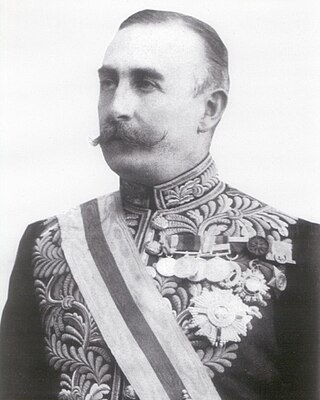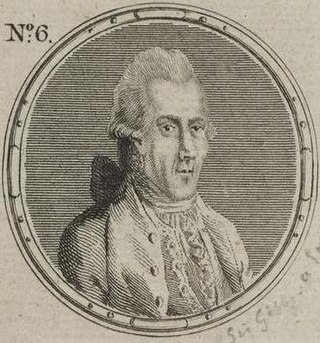
Gilbert Elliot-Murray-Kynynmound, 1st Earl of Minto,, known as Sir Gilbert Elliott, 4th Baronet until 1797, and the Lord Minto from 1797 to 1813, was a British diplomat and politician who sat in the House of Commons between 1776 and 1795. He was viceroy of the short-lived Anglo-Corsican Kingdom from 1794 to 1796 and went on to become Governor-General of India between July 1807 and 1813.

Gilbert John Elliot-Murray-Kynynmound, 4th Earl of Minto,, known as Viscount Melgund by courtesy from 1859 to 1891, was a British peer and politician who served as Governor General of Canada from 1898 to 1904, and Viceroy of India from 1905 to 1910.
Gilbert Elliot, Elliott or Eliott may refer to:

Gilbert Elliot-Murray-Kynynmound, 2nd Earl of Minto,, styled as Viscount Melgund between 1813 and 1814, was a British diplomat and Whig politician.

Earl of Minto, in the County of Roxburgh, is a title in the Peerage of the United Kingdom. It was created in 1813 for Gilbert Elliot-Murray-Kynynmound, 1st Baron Minto. The current earl is Gilbert Timothy George Lariston Elliot-Murray-Kynynmound, 7th Earl of Minto.

The Eliott Baronetcy, of Stobs in the County of Roxburgh, is a title in the Baronetage of Nova Scotia. It was created on 3 December 1666 for Gilbert Eliott. The second baronet was a member of the pre-union Parliament of Scotland. The third Baronet sat as Member of Parliament for Roxburghshire. The Eliott Baronets share a common early Elliot ancestry with the nearby Earls of Minto (Elliot). It is thought that the surname spelling differences were contrived to differentiate the branches.
Sir David Dalrymple, 1st Baronet, of Hailes was a Scottish advocate and politician who sat in the Parliament of Scotland from 1698 to 1707 and in the British House of Commons from 1707 to 1721. He served as Lord Advocate, and eventually Auditor of the Exchequer in Scotland in 1720.

Clan Eliott is a Border Reiver Scottish clan.

Clan Primrose is a Lowland Scottish clan.
Minto is a village and parish in the Scottish Borders area of Scotland in Roxburghshire county. It is located 6 miles north-east of Hawick, north of the River Teviot.

Sir Gilbert Elliot, 3rd Baronet, was born at Minto, Roxburghshire, and was a Scottish statesman, philosopher and poet.

John Edmund Elliot was a British Whig politician.

Admiral Sir George Elliot was a Royal Navy officer who served during the French Revolutionary and Napoleonic Wars, and the First Opium War.
Sir Robert Steuart, 1st Baronet of Allanbank was a Scottish politician who represented North Berwick in the Parliament of Scotland from 1698 to 1702.
Sir Gilbert Elliot, 2nd Baronet, was a Scottish lawyer, politician and judge from Minto in the Scottish Borders. From 1763 until his death 3 years later, he was Lord Justice Clerk, the second most senior judge in Scotland.
Sir Gilbert Eliott, 3rd Baronet, of Stobs was a Scottish Whig politician who sat in the British House of Commons between 1708 and 1727. He was outlawed after killing his opponent in an after-dinner argument and fight, but was subsequently pardoned.
Events from the year 1718 in Scotland.
The Minto Papers is a collection of family, estate and political manuscripts related to the family of Gilbert Elliot-Murray-Kynynmound, 1st Baron Minto and his descendants. The collection has in it over 2000 manuscript volumes. The bulk of the collection was initially purchased in 1958 by the National Library of Scotland (NLS), with later additions to the collection made by purchase and donation. The collection is stored at the NLS main building on George IV Bridge in Edinburgh, Scotland.
Major John Rutherfurd of Edgerston was a Scottish soldier and politician.
John Rutherfurd of Edgerston was a Scottish soldier and politician.










